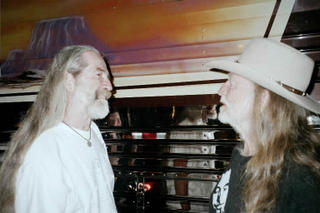
Who is the Red Headed Stranger? I'll give you some clues:
His bus runs on veggie oil
His Mercedes runs on it too
He can't wait to get on the road again
Mr Logan is a big fan
So you can imagine that when I saw the news that Willie has branded his own biodiesel--BioWillie--I knew I had to put it in my blog. From suppliers Distribution Drive:
Nelson and three business partners recently formed a company called Willie Nelson’s Biodiesel that is marketing the fuel to truck stops. The fuel, called BioWillie, is made from vegetable oils, mainly soybeans, and can be burned without modification to diesel engines. It may be difficult to picture the 71-year-old hair-braided Texas rebel as an energy company executive, but the singer’s new gig is in many ways about social responsibility — and that is classic Nelson.
“There is really no need going around starting wars over oil. We have it here at home. We have the necessary product, the farmers can grow it,” said Nelson, who organized Farm Aid two decades ago to draw attention to the plight of American agriculture.
The benefits are:
- burns clean--has fewer dangerous emissions
- gets better fuel mileage--1 mpg adds up
- helps the farms--both growers of soybeans and beef
- reduces our dependency on oil and oil imports
- in some instances, lowers cost
- reduces engine wear and cleans out sludge
- does not require retrofitting
- you can even make soap from the waste glycerin!
Common Dreams News Center published an entertaining article (worth a read) but I am posting the serious part here for those interested in the real energy cost of biodeisel:
Whether biodiesel can really fulfill the promise...remains an open question. Ethanol triggered a similar wave of excitement in the 1990s, but has provoked mixed feelings since - first because a number of studies showed that producing ethanol takes as much energy, if not more, than can be extracted from it afterwards; and secondly because it became apparent big agribusiness companies were taking advantage of the fad, and the federal subsidies that came with it, to dump their excess grain at the expense of small producers.
Biodiesel may be vulnerable to similar problems. A study published this week by researchers at Cornell and Berkeley universities suggested biodiesel, like ethanol, may require more energy to make than it produces. That finding, however, is contradicted by a 1998 study by the Environmental Protection Agency, which said that for every unit of energy going into biodiesel, 3.2 units are generated.
Mark Bernstein, an energy specialist and senior policy researcher with the Rand Corporation, said the truth was probably somewhere in the middle, not least because the technologies for extracting energy from raw materials were evolving all the time. "If you are using waste products - used oil and grease - then there's probably a net energy benefit you don't get if you have to grind the seeds from scratch," he said. "It also depends on the plant. Some plants are better for converting than others. The thing about biodiesel and ethanol is that they are good niche markets and we need those niche markets. But it's also clear that for a wide-scale use, the technology is not here yet."
 The exciting thing about BioWillie is that it is reaching the trucker market. This means that biodeisel is spreading to individual consumers. Government fleets have been the previous consumers because they are mandated to use cleaner fuels. But a new day is dawning. How can anyone resist Willie? As Mr. Logan says "I may be better looking than him, but he sure sings pretty."
The exciting thing about BioWillie is that it is reaching the trucker market. This means that biodeisel is spreading to individual consumers. Government fleets have been the previous consumers because they are mandated to use cleaner fuels. But a new day is dawning. How can anyone resist Willie? As Mr. Logan says "I may be better looking than him, but he sure sings pretty."
No comments:
Post a Comment